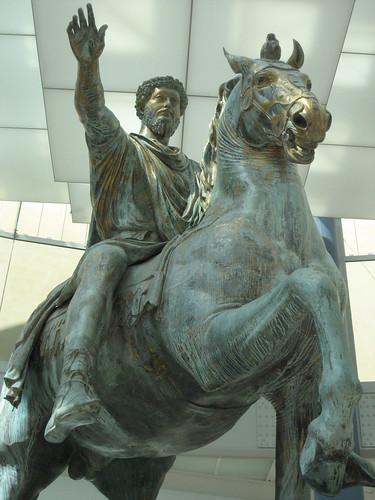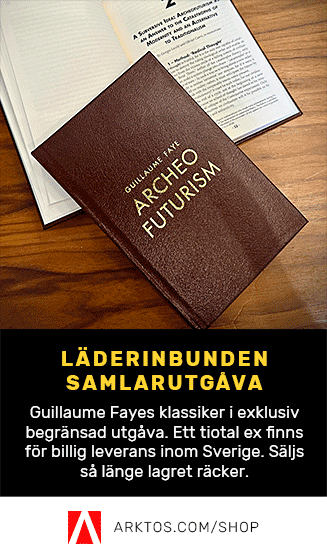Francis Parker Yockey är mest känd för sitt magnum opus, Imperium. Han beskriver där, med utgångspunkt i bland annat Carl Schmitt och Oswald Spengler, de organiska lagar som gäller i politikens sfär och för de överindividuella organismer som kallas högkulturer. Vår tids enda högkultur är Europa, och för Yockey var det en tragedi att hon ockuperades av USA och Sovjet. Han vigde sitt liv åt att kämpa för Europas frihet, och dog också under försöket. Yockey är en av våra martyrer, en av våra hjältar, och även en av våra mest originella och givande tänkare.
Han skrev vid sidan av Imperium den kortare The Enemy of Europe, där han tillämpar de politikens och högkulturernas lagar han identifierat i Imperium på situationen under den första halvan av 1900-talet. En del har i efterhand visat sig vara felaktigt, exempelvis kastade Japan inte av sig det amerikanska oket och inte heller utbröt ett tredje världskrig. Men Yockeys perspektiv är av stort värde, och han ställer också flera frågor kring sådant som det politiska, vad vi egentligen verkar för, och så vidare. Dagens inlägg kommer därför att utgöras av en samling utdrag ur The Enemy of Europe.

Europa eller den Yttre Revolten
…if Europeans would take an active part in the world power-struggle, now, more than ever before, they must put their politics on an intellectual basis, for no physical force whatever is available to them. They must outwit the enemy at every turn, outplay him, until, years later, they will eventually be in a position to dictate conditions…
Den centrala distinktionen för Yockey står mellan vår tids Högkultur, Europa, och den instinktiva reaktion Europas existens och expansion väcker bland de folk som inte är en del av högkulturen. Det kan sedan röra sig om det han kallar fellaheen, resterna av döda högkulturer, barbarer, och andra. Yockey kallade sin politiska position imperialistisk, och identifierade sig helhjärtat med Europa mot omvärlden. Detta inte minst då han menade att makt antingen ökar eller minskar, när man upphör att expandera är det bara en tidsfråga innan man degenererar.
The aim of Politics is to obtain power…The politician who resorts to laws and morality to disguise his power-position is suffering from a bad political conscience, and the politician or the state with a bad conscience is decadent. Ascendent politics is not afraid of being politics. Decadent politics passes itself off as religion, law, morality, science – in short, as anything other than Politics.
Den instinktiva reaktionen mot Europas världshegemoni kallar Yockey ”the Outer Revolt”. Han menar att Andra Världskriget spelade en mycket negativ roll i sammanhanget. Det naturliga hade varit att europeiska makter slutit sig samman mot utomeuropeiska makter, och lagt världen under sig. Istället hade USA, ursprungligen en europeisk koloni, tagits över av ett icke-europeiskt kollektiv, det judiska. Amerikanska intressen drev därför brittiska politiker att vända sig mot Tyskland, och Världskriget utvecklades till ett europeiskt brödrakrig som lämnade Europa maktlöst och ockuperat av utomeuropeiska makter. Yockey skriver:
Had the War assumed the organic form, an English-German coalition against the rising Asiatic menace, it would have ended in a European victory and brought the whole planet under the influence of Europe… since the scale of political activity has become planetary, only two spiritual possibilities for a conflict remain; first, the Western Idea of world-rule; and second, the Outer Revolt, which is simply a negation of this Western idea… on the planet there is only one High Culture in the process of fulfilment, the Western Culture. Outside that Culture, there are only remnants of dead Cultures, whose peoples have once again become primitive, fellaheen, like the Chinese, Hindu, and Islamic; savages, like the African and Australian aborigines; barbarians, like the Russians and certain tribes in Central Asia…

That a general war would break out, all statesmen and general thinkers were agreed; only its form was not foreseen, nor could it have been. The natural form corresponding to the power-problems posed by the power-currents would have been England and Germany versus Russia and Japan. Since England and Germany belonged to the same Culture and had a common destiny, as they always shall, any war between these two states had to benefit powers outside Europe… Germany lost power, true; however England lost even more…
Han menar också att USA idag är förlorat för Europa:
So long as America was dominated by men of stocks from Culture-European soil, America was a European colony, even though sometimes vocally rebellious. But the America that has been distorted by the Revolution of 1933 is lost to Europe. Let no European dream of help or cooperation from that quarter…
Yockey förklarar också jakten på alla konservativa i Europa under ockupationen, den såkallade ”denazifiering” som också drabbade konservativa som aldrig sympatiserat med nationalsocialismen, och som lämnat de politiskt korrekta utan egentligt motstånd. Vad det handlade om var att utplåna det skikt som kunde identifiera högkulturens karaktär och intressen:
During the War, some Europeans entertained the comfortable illusion that the Washington regime was hostile only to certain states in Europe, certain Culture-peoples in Europe, certain ideas in Europe. Nevertheless, the Washington regime’s real enemy was Europe, which means above all, the Culture-bearing stratum of Europe…”entnazifiziering”… were performed in all parts of Europe at the behest of the Washington regime.
Istället förde man fram en ny ”elit”, rekryterad bland de sämsta skikten. Yockey kallar detta skikt Michels:
The American occupation brought into the open a whole stratum of the European population that had hitherto never been recognised as a unit. In Germany the expression ”der Deutsche Michel” has long been current. It pertains to the type with anti-national instincts, an enthusiast for talk instead of action, likewise for anti-social individualism, laissez-faire, and parliamentarism, a person who cringes to aliens, a natural, instinctive, organic, traitor.
Nation Europa och den etiska socialismen
Dessa skikt spred idéer som egentligen var föråldrade, som liberalism och klasskampssocialism. Mot detta ställer Yockey det han kallar etisk socialism, i traditionen från Bismarck och Spengler. Det är en heroisk, social och europeisk socialism han här skisserar:
The metapolitical explanation for the intra-European power-current from England to Germany is simple. The decline and inevitable demise of the English Nation-Idea was part of the development of the Western Culture from the first phase of Civilisation, the Age of Economics, to the second phase, the Age of Absolute Politics… the new age, the Age of Absolute Politics, in which Politics rules unconditionally over every aspect of life in the Western Civilisation, demands a different type of nation, a different Internationale… the Prussian-German nation is that one of the Western nations whose national Idea thoroughly corresponds to the Cultural Imperative in the Age of Absolute Politics. For the solution of its tasks this Age demands the old Roman virtues: a soldierly ethos and honour-feeling, political-organisatory talent, firmness, conscientiousness, devotion to duty, will-to-power instead of will-to plunder.
Ett lika kontroversiellt inslag som Yockeys tes att judar är en icke-europeisk grupp som fört den Yttre Revolten in i hjärtat av USA:s maktcentra är här hans syn på Hitler som vår tids hjälte. Att han långt efter sin död spelar en central roll i både politik och mytologi kommer man dock inte ifrån, Yockeys skildring av hur makthavarna är ”besatta” av den tyske ledaren är alltså korrekt än idag:
After the Second World War, the opponents of the Hero of that War were still dominated by his compelling personality. Either they took up his ideas and declared them their own, or they continued to fight against him. Of a new Idea, independent of that Hero, there was not a trace.
Samtidigt betraktar Yockey det som tragiskt att den etiska socialism och sameuropeiska vision som det tyska projektet representerade kom att kombineras med 1800-talets rasmaterialism. Detta var inte gynnsamt, det var egentligen inte heller nödvändigt och hade kunnat undvikas. Yockey menar istället att den europeiska högkulturen kan man tillhöra oavsett biologisk ras, bland annat menar han att grupper av judar och ryssar historiskt assimilerats in i den.
In this century the idea of vertical race is dead. We can now view race only in horizontal terms – the race one feels in oneself is everything, the anatomic-geographic group to which one belongs means nothing… our touchstone of comradeship and belonging is spiritual-ethical, not the old one of birth-place, cephalic-index, eye-colour.
Man kan här också nämna Yockeys syn på nationer. Deras tid är över, som idéer finns de inte längre. Istället tillhör vår tid den europeiska idén och den etiska socialismen.
The great nation-forming Ethic in this stage of European history is the Prussian-German Idea of Ethical Socialism. Only this living, wordless Idea can banish the overshadowing extra-European powers, form the European Imperium, and lead the West to the fulfilment of its World-Mission. Imbued with the new Ethic and free of petty-statist 19th century nationalism, the European nations will climb out of the abyss as a unity, or they will never climb out at all.

En intressant tanke hos Yockey är även att den högre typ av europé han riktar sig till kan identifiera sig med den europeiska historien, då han eller hon genomlevt samma faser i sitt individuella liv:
Today the loftier European identifies himself with… the totality of our precious Western History, for that History is his own spiritual biography written before him in large letters. He, too, had his Gothic, Reformation, Enlightenment, and rationalist-revolutionary phase – his youthful religiosity and crusades, his Democratic-Liberal-Communist phase, and now, in his fullest maturity, he has entered, spiritually and materially, the Age of Absolute Politics… Western History describes ourselves.
Mer kontroversiell är då hans tes att en sådan högre europé alltid sympatiserar med Europa mot den yttre revolten, oavsett sådant som moral.
In his historical orientation, the Westerner of the higher type, who alone has Cultural value and significance, regards events in which the West was pitted against the Outer Forces with a completely subjective eye… He is for Charles XII against the Russians, for England against the Indian Mutiny, against the Zulus, and against China in the Opium War.
Intressant är däremot att Yockey redan under det kalla kriget kom att betrakta Sovjet som en mindre dödlig fiende än USA. USA var i hans ögon kontrollerat av judiska intressen, medan ryssarna i grunden är barbarer. Och som barbarer kunde de relativt lätt assimileras av den europeiska högkulturen om de genom erövring kom i för nära kontakt med den.
In this period of history, America and Jewry form a Symbiosis. The head of the organism is the Jewish entity, the body is America.
Russian Bolshevism is therefore less dangerous to Europe than American-Jewish Bolshevism, for no aspect of its menace corresponds to a weakness in Europe’s spiritual armour… an attempt by Russia to integrate Europe into its power-accumulation would eventually result in the rise of a new Symbiosis: Europe-Russia. Its final form would be that of a European Imperium.
Även om man inte delar alla Yockeys tankar är det alltså en intressant analys han utvecklar. Europa är idag lika splittrat som när han skrev, och hennes etablissemang lika kontrollerat av amerikanska intressen och 1800-talsideologier. Men dessa amerikanska intressen tycks befinna sig i en växande kris och kan snart komma att ersättas av Imperium Europa.
Our European Mission is to create the Culture-State-Nation-Imperium of the West, and thereby we shall perform such deeds, accomplish such works, and so transform our world that our distant posterity, when they behold the remains of our buildings and ramparts, will tell their grandchildren that on the soil of Europe once dwelt a tribe of gods.
Relaterat
F.P. Yockey och Imperium
F.P. Yockey – Imperium eller kapital
F.P. Yockey – Kulturella perspektiv på massinvandringen
Jean Thiriart och Nation Europa














